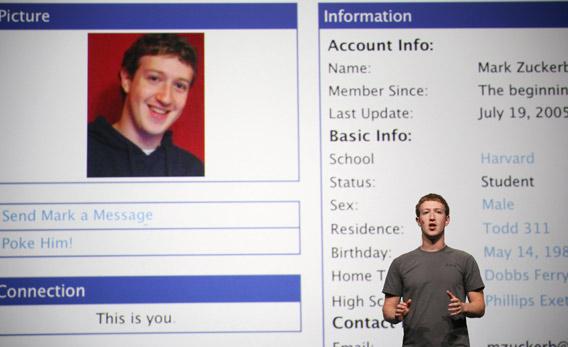“It’s Not All Facebook’s Fault: You’re as much to blame for the site’s privacy woes as Mark Zuckerberg,” by Farhad Manjoo. Facebook has undergone several different privacy makeovers in the last year and a half. But how private can a social networking site really be? Comparing the notion of a totally private Facebook to “expecting modesty at a strip club,” Manjoo argues that our desire for online privacy is incompatible with the way people use Facebook to share things and connect with people online.
“DWI Versus DW-High: Is it more dangerous to drive drunk or stoned?” by Brian Palmer. A new study suggests that legalizing marijuana reduces alcohol consumption, which also reduces traffic fatalities. The study authors found that people are more hesitant to drive stoned than drunk, but is one form of intoxicated driving actually more dangerous? Yep. As Palmer explains, it’s alcohol, and the contest is “not even close.”
“The Great Silence: E.T. is out there. Why can’t we find him?” by Chris Wilson. There are about 200 billion stars in the Milky Way, and we’ve already found a few dozen potentially hospitable planets. But science still hasn’t located our own real-life version of E.T. In a two-part series, Wilson explains how we may simply be missing nearby extraterrestrial life due to the enormity of the galaxy. He even offers a suggestion to aid in the search: Let them come to us.
“If I Were King …: Newt Gingrich is the only candidate who knows what he’d actually do as president,” by John Dickerson. Presidential candidates are notorious for offering vague policy prescriptions and evasive answers. In an election cycle where standard campaign promises include repealing health care and balancing a staggeringly uneven budget, one candidate has emerged as surprisingly realistic: Newt Gingrich. Dickerson explains how Gingrich’s candor on issues such as immigration set him apart from the rest of the pack, even if his honest habits sometimes get him in trouble with his own party.
“My Miraculous Conception: How two infertility doctors, a team of nurses, an embryologist, an acupuncturist, my husband, and I made a baby,” by Shawnee Barton. After three years of never-ending fertility treatments—everything from holistic medicine to cutting-edge technology—nothing seemed to help Barton get pregnant. Her doctor was pessimistic, too, warning that she might never conceive. In early 2010, Barton and her husband decided it was time for more drastic measures. They started documenting her first IVF cycle, which turned out to be the only one she needed to give birth to her daughter. Check out the photo slide show to see how Barton made a baby “the IVF way.”
“The Death of Titles: I Hate My Teenage Daughter, Tower Heist, Cowboys and Aliens—why can’t anyone think up a decent title anymore?” by Jacob Rubin. Movie titles today don’t leave much up to the imagination. Just guess what Snakes on a Plane is about. Longing for the days of “pungent, enigmatic titles” like Three Days of the Condor, Rubin explains how the practical evolution of more descriptive movie titles can spoil a narrative and result in a “reductive cultural frame.”
“Military Police State: Why is the Senate so determined to allow the U.S. military to arrest and detain U.S. citizens?” by Dahlia Lithwick. On Tuesday, 60 Senators approved a bill that allows the military to “pick up and detain, without charges or trial, anyone suspected of terrorism,” including American citizens. It effectively ignores that whole “innocent until proven guilty” idea and the constitution’s protection of civil liberties. Lithwick explores the bleak prospects for a law that grants sweeping executive power and threatens the separation between law enforcement and military authority.
“ ’A Robot Has Shot Its Master’: The 1930s hysteria about machines taking jobs and killing people,” by Matt Novak. Urban legend recalls a 1932 British inventor whose robotic creation shot its master. This never really happened, but people were willing to believe it. Why? Economic insecurity during the Great Depression led to a robot panic, Novak explains. Capitalizing on the fears of people already traumatized by staggering unemployment and bleak financial prospects, robots were the perfect symbol of menacing new technology. Don’t miss the accompanying photo slideshow of the paranoid Great Depression media depictions of robots.
“Air Fail: Blame Jimmy Carter for all the airline bankruptcies. Or better yet, thank him,” by Matthew Yglesias. The parent company of American Airlines filed for Chapter 11 bankruptcy protection this week surprising “exactly no one,” Yglesias says. That’s partly because 189 airlines have declared bankruptcy since 1990. But why? Yglesias explains how obscure deregulation measures passed during the Carter administration sunk airlines’ per-passenger revenue stream and made bankruptcies increasingly common in the industry. Despite the business implications of this shift, there was (and is) a silver lining for consumers: The same phenomenon decreased ticket costs.
“Christmas Carols: Why do we keep singing them?” by Nathan Heller. From classics like “Silent Night” to new incarnations of Christmas carols by Justin Bieber, the holiday genre just won’t go away. Heller explains how carols—despite their questionable musical ingenuity upon first listen—often reveal deeper cultural trends and anxieties. Example 1: “I Saw Mommy Kissing Santa Claus” as complex Freudian trauma.
